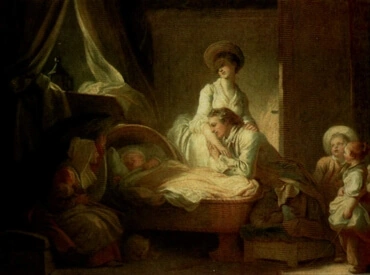In a general sense, being "born" in the Bible represents one spiritual state producing another, usually some form of love or affection producing or "giving birth" to truth or to desires for good. This is not hard to see: If you love someone, that love naturally gives birth to ideas on how to be good to that person and make him or her happy. This is why sons and daughters in the Bible represent true ideas and desires for good. On a higher level, though, being born represents what the Writings call "regeneration," or the life-long process of putting off our natural thoughts and desires and embracing spiritual life from the Lord. This is what the Bible means when it talks about being "born again" – if we live our lives from the Lord, He will eventually take away our evil desires so that we can be "born" as angels in heaven, free of evil desires and dark thoughts. Of course, these two levels of meaning are really one: The Lord is love itself, and if we align with Him we become forms of love and truth ourselves, expressions of His love just as the desire to do something good might be the expression of your love for a friend.
Arcana Coelestia #5348
5348. 'And to Joseph were born two sons' means the good and truth born from this, that is to say, from the influx of the celestial of the spiritual into the natural. This is clear from the meaning of 'being born' as being reborn, and so the birth of truth derived from good or faith derived from charity, dealt with in 4070, 4668, 5160 (for the generations described in the Word are spiritual ones, see 1145, 1255, 1330, 3263, 3279, 3860, 3866); and from the meaning of 'sons', who in this case are Manasseh and Ephraim, as good and truth, dealt with immediately below. For 'Manasseh' means the area of will belonging to the new natural, while 'Ephraim' means the area of understanding belonging to it. Or what amounts to the same, 'Manasseh' means the good present in the new natural, since good exists as an attribute of the will, while 'Ephraim' means the truth present there, since truth exists as an attribute of the understanding. One reads in other places about the birth of two sons. Good is meant by one, truth by the other, as for instance with Esau and Jacob. 'Esau' means good, see 3302, 3322, 3494, 3504, 3576, 3599, while 'Jacob' means truth, 3305, 3509, 3525, 3546, 3576. The like is meant by Judah's two sons by Tamar, Perez and Zerah, 4927-4929; and the same applies here in the case of Manasseh and Ephraim. The birth of these is dealt with here because the subject in what went immediately before this was the influx of the celestial of the spiritual into the natural and the consequent rebirth of it, which is effected solely by means of good and truth.
Arcana Coelestia #3251
3251. 'These are the days of the years of Abraham's life which he lived' means the state representative of the Lord as regards the Divine itself that was portrayed by means of Abraham. This is clear from the meaning of 'days' and of 'years' as states, dealt with in 23, 487, 488, 493, 893, 2788, and from the meaning here of 'life' also as state, dealt with in 2904, here as the representative states portrayed by means of Abraham. Indeed his whole life as described in the Word was representative, the end of which life is the subject now. The consideration that Abraham represented the Lord as regards the Divine itself has been shown in the explanations that have been given, and so as to represent Him he was named Abraham - the letter H, taken from the name Jehovah, having been inserted, 2010. Abraham represented both the Divine itself, which is called the Father, and the Divine Human, which is referred to as the Son. He accordingly represented the Lord as regards both, though the Divine Human represented by Him was the Divine Human existing from eternity, of which the Lord was the manifestation and to which He subordinated the Human born in time when He glorified it. This is the representation of the Lord portrayed by means of Abraham.







